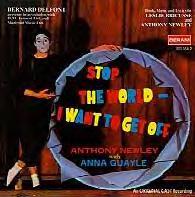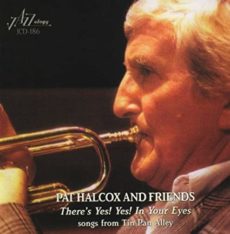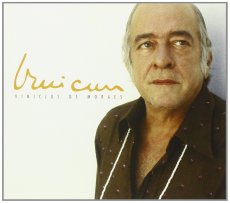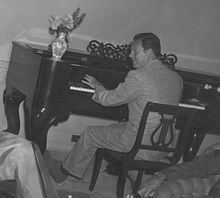
Daily Dose Of Jazz…
Leslie Bricusse was born on January 29, 1931 in Pinner, Middlesex, England. He was educated at University College School in London, England and then at Gonville and Caius College, Cambridge. While at Cambridge, he was Secretary then President of Footlights and during his college drama career he began working for actress, singer and comedian Beatrice Lillie.
In the 1960s and 1970s, Bricusse enjoyed a fruitful partnership with Anthony Newley. They wrote the musical Stop the World – I Want to Get Off in 1961,that became a film in 1966. In 1965 they wrote the show The Roar of the Greasepaint – The Smell of the Crowd and music for the film Willy Wonka & the Chocolate Factory in 1971. For the latter, they received an Academy Award nomination for Best Original Song Score.
Solely as a lyricist, Leslie collaborated with composer Cyril Ornadel on Pickwick, Henry Mancini on Victor/Victoria, Tom and Jerry: The Movie, and with John Williams on Hook. As composer and lyricist he scored the film, Doctor Dolittle and received a 1967 Academy Award for Best Original Song for Talk To The Animals, and Goodbye, Mr. Chips in 1969.
Of his many songs a few that have become jazz standards are What Kind of Fool Am I?, Who Can I Turn To?, Feeling Good, My Kind of Girl, Two For The Road, If I Ruled the World, Can You Read My Mind, When I Look in Your Eyes, and Pure Imagination.
In 2015, he released his memoir, Pure Imagination: A Sorta-Biography, with a foreword by Elton John. Composer, lyricist, and playwright Leslie Bricusse, who was awarded the Order of the British Empire, transitioned on October 19, 2021 in Saint-Paul-de-Vence, France at the age of 90.

More Posts: composer,history,instrumental,jazz,lyricist,music,playwright

Daily Dose Of Jazz…
Patrick John Halcox, born March 18, 1930 in Chelsea, London, was originally offered a band spot earlier but elected to continue his studies as a research chemist. Ken Colyer was invited to fill the vacancy in 1953, which became known as the Ken Colyer Jazz Band, playing in a New Orleans style with Chris Barber, Lonnie Donegan and Monty Sunshine.
The band effectively parted company with Colyer in 1954 after a dispute about its musical direction. Halcox took Colyer’s place, in what then become Barber’s group and as the original six-piece band eventually grew to eleven members, he remained present. Although primarily the trumpet player, he had a fine singing voice and led the band’s various renditions of Ice Cream, one of their most popular standards. He also played piano on the Lonnie Donegan recording of Digging My Potatoes.
The Pat Halcox Allstars did make a recording of their own during a Chris Barber Band summer break, now re-released as a Lake Records CD. Trumpeter and vocalist Pat Halcox announced his retirement from the Chris Barber Band at the age of 78, effective in 2008 and passed away on February 4, 2013 at the age of 82.
More Posts: bandleader,hiwstory,instrumental,jazz,music,trumpet,vocal

Daily Dose Of Jazz…
Ira Gershwin was born on December 6, 1896 in New York City, the oldest of four children of Moishe and Rose Gershovitz, who were Russian Jews, born in St Petersburg, and emigrated to the US in 1891. Shy in his youth, Ira spent much of his time at home reading, but from grammar school through college he played a prominent part in several school newspapers and magazines. Graduating in 1914 from Townsend Harris High School where he had met Yip Harburg, they enjoyed a lifelong friendship and a love of Gilbert and Sullivan. He went on to attend City College of New York but dropped out.
His brother George began composing and plugging in Tin Pan Alley from the age of 18, while Ira worked as a cashier in his father’s Turkish baths. It was not until 1921 that Ira became involved in the music business when Alex Aarons signed Ira to write the songs for his next show, Two Little Girls in Blue. Not to appear to trade off George’s growing reputation, he wrote under the pseudonym Arthur Francis, after his youngest two siblings. His lyrics were well received, allowing him successfully to enter the show-business world with just one show.
Later the same year, the Gershwins collaborated for the first time on a score of A Dangerous Maid, which played in Atlantic City and on tour. 1924 saw Ira officially teaming with George to write the music for what became their first Broadway hit Lady, Be Good. Once the brothers joined forces, their combined talents became one of the most influential forces in the history of American Musical Theatre. Together, they wrote the music for more than 12 shows and four films.
Their partnership continued until George’s sudden death from a brain tumor in 1937 and he waited nearly three years before writing again. Returning from this hiatus, Ira teamed up with composers Jerome Kern, Kurt Weill and Harold Arlen among others. Over the next 14 years, Ira gave his farewell to Broadway with the failure of Park Avenue in 1946. In 1947, he took 11 songs George had written but never used, added lyrics, and incorporated them into the film The Shocking Miss Pilgrim.
For the next four decades he would continue to write lyrics leaving such memorable classics as Embraceable You, I Can’t Get Started, Let’s Call the Whole Thing Off, My Ship and They Can’t Take That Away from Me, among numerous others. Lyricist Ira Gershwin passed away on August 17, 1983 at the age of 86 in Beverly Hills, California.
More Posts: lyrics

Daily Dose Of Jazz…
Vinicius de Moraes was born Marcus Vinicius de Moraes on October 19, 1913 in Rio de Janiero, Brasil. As a child he was exposed to various musicians and composers and in high school he was writing his first compositions. He went on to graduate college at twenty and published two books of poetry.
Over the next several years he held a variety of banking, government and diplomatic positions while still writing and publishing his poetry. But it wasn’t until the ‘50s that he moved into the realm of pop culture. He studied film festival management, wrote his first samba, contributed lyrics to several classical pieces and in 1956 Vinicius staged his musical play Orfeu da Conceicao that would later become Orfeu Negro or Black Orpheus and win an Academy Award for Best For Language Film in 1959, a British Academy Award and the French Palm d’Or at Cannes.
Collaborating with Antonio Carlos Jobim, Moraes was at the fore when the bossa nova movement began with the release of Elizete Cardoso’s album Cancao do Amor Demais that consisted of the pairs music and a then unknown Joao Gilberto. They went on to compose Garota de Ipanema, Insensitez and Chega de Saudade. Vinicius’ songs would go on to be included in another Cannes winner Un Homme et une Femme (A Man and A Woman) in 1966.
In the 1960s and 1970s, Vinicius continued collaborating with many renowned Brazilian singers and musicians, in particular with Baden Powell venturing into Afro-Brazilian influences that came to be known as collectively as Afro-Sambas. A known bohemian and diplomat, Vinicius also had a problem with alcohol that ultimately had him drummed out of the diplomatic corps by the military regime. But with his new partner, guitarist and singer Toquinho, he continued to realize success on both music and literary landscapes releasing several popular and influential albums.
Vinicius de Moraes, composer, playwright and diplomat nicknamed O Poetinha (The Little Poet), passed away on July 9, 1980 in Rio de Janiero after a long spell of poor health. Hundreds of jazz musicians and performers worldwide have recorded more than 400 of his songs. In 2006 he was reinstated into the diplomatic corps and in 2010 was posthumously promoted to the post of Ambassador by the Brazilian Chamber of Deputies.

Daily Dose Of Jazz…
Irving Gordon was born in Brooklyn, New York on February 14, 1915 and as a child, studied violin. After attending public schools in New York City, he went to work in the Catskill Mountains at some of the resort hotels in the area. While working the resorts, he took to writing parody lyrics to some of the popular songs of the day. He has been credited with writing “Who’s On First” made famous by Abbott and Costello, according to his son William.
In the 1930s, he took a job with the music-publishing firm headed by talent agent Irving Mills, at first writing only lyrics but subsequently writing music as well. Together they wrote two songs for Duke Ellington, Please Forgive Me and Prelude To A Kiss and co-wrote Blue Prelude with Ellington.
After writing Mister and Mississippi, a Patti Page hit, Irving decided he enjoyed puns on state names, and some years later wrote Delaware, a Perry Como hit. He also went on to write for Bing Crosby, Eddy Arnold and Billie Holiday. But he is perhaps best known for his song, “Unforgettable” recorded by Nat King Cole in 1951 and then three Grammys in 1992 by his daughter Natalie Cole, in which Gordon himself received a Grammy. Nat’s version was inducted into the Grammy Hall of Fame in 2000.
In the 1940’s he moved to Los Angeles where he spent the rest of his life continually writing and composing and is noted for his contribution in music and lyrics of the Americana genre. Songwriter Irving Gordon passed away in his home of cancer on December 1, 1996.
More Posts: songwriter





